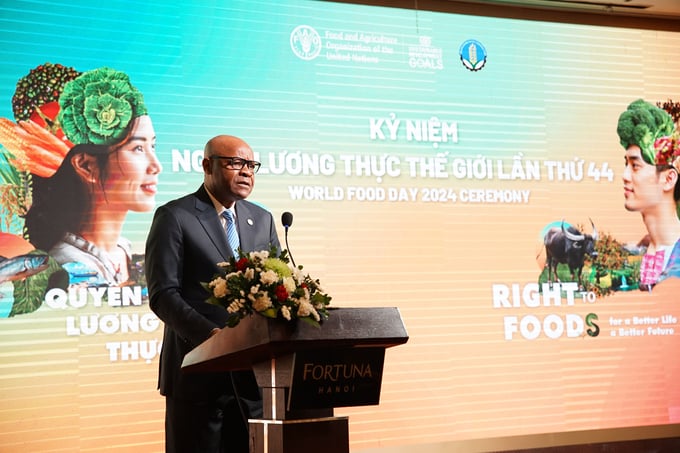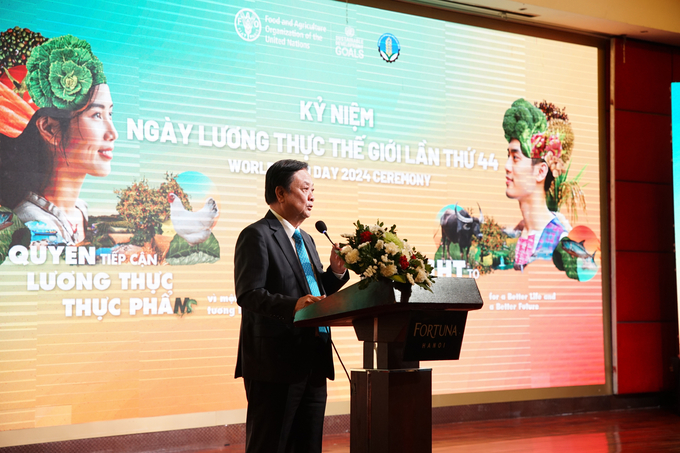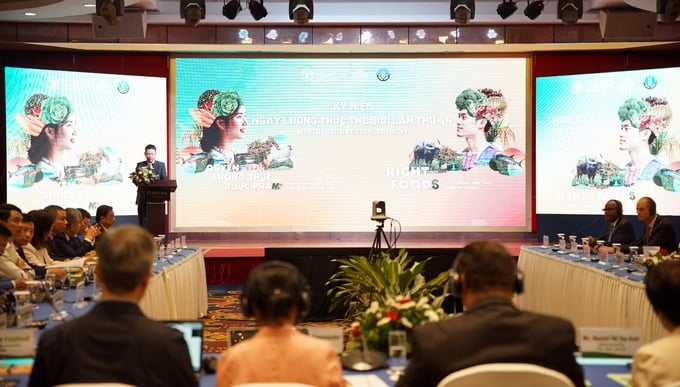May 24, 2025 | 16:22 GMT +7
May 24, 2025 | 16:22 GMT +7
Hotline: 0913.378.918
May 24, 2025 | 16:22 GMT +7
Hotline: 0913.378.918
The Ministry of Agriculture and Rural Development (MARD), the United Nations in Vietnam, and the Food and Agriculture Organization (FAO) of the United Nations in Vietnam jointly commemorated the Word Food Day 2024. On this occasion, MARD also launched the Plan for International Cooperation Promotion in Agriculture and Rural Development to 2030 and vision to 2050; signed the Partnership Agreement for Transparent, Responsible and Sustainable Food Systems Transformation in Vietnam (FST-Partnership); and kicked off the Joint Programme of United Nations on “Incubation of Innovations in Partnerships and Financing for Agrifood Systems Transformation in Vietnam”.
This event was co-chaired by Mr. Le Minh Hoan, Minister of Agriculture and Rural Development and Mr. Rémi Nono Womdim, FAO Representative to Vietnam cum UN Resident Coordinator ad interim. The event was conducted in hybrid format, with approximately 150 delegates attending. Participants included leaders from the Ministry of Health, and the provinces of Dien Bien, Son La, and Dong Thap; as well as the Ambassadors and Heads of UN Agencies in Vietnam; the development partners; leaders of civil society organizations, research institutes, NGOs; the experts, policymakers from national national and international organizations; and the private sector.

Mr. Rémi Nono Womdim, FAO Representative, emphasized the right to access food. Photo: Linh Linh.
The World Food Day 2024, with the theme “Right to foods for a better life and a better future”, offers an opportunity to widely share the global commitment to ensuring all people have the right to adequate food through the transformation of food systems sustainably and equitably.
Food is the third most basic human need after air and water. However, not everyone in the world today has access to enough food for a healthy life. Currently, about 733 million people are short of food, primarily due to conflict, climate change, poverty and economic downturns. More than 2.8 billion people cannot afford healthy diets. FAO, as a specialized agency of the United Nations and a leading intergovernmental organization, advocates for and supports the realization of the right to food through providing technical assistance in policy and legislation, strengthening governance and monitoring systems, building capacity, and promoting policy dialogue among stakeholders. “We talk about “foods” in the plural because diversity is essential to proper nutrition, as well as food availability, accessibility and affordability for all” said Mr. Rémi Nono Womdim, FAO Representative to Vietnam.
Throughout the development of the agriculture sector, Vietnam has not only relied on its own efforts but also benefited from the significant contributions of international partners. In the current context, Vietnamese agriculture needs to take more concrete actions to strengthen cooperation and leverage external support to achieve its development goals and meet the international commitment that Vietnam has undertaken.
Marking the 44th World Food Day, the Ministry of Agriculture and Rural Development announced the “Plan for International Cooperation Promotion in Agriculture and Rural Development to 2030 and vision to 2050”. The Plan aims to actively and responsibly engage in globalization and tackle the challenges of global agriculture, integrating agriculture into the global market while mobilizing human resources, technology, and foreign investment to support the rapid and sustainable development of agriculture and rural areas in Vietnam. The Plan outlines specific solutions and priority tasks that the Ministry coordinates closely with international partners and relevant ministries to implement from now until 2030, with a vision to 2050, contributing to achieving the strategies, plans, and commitments assigned by the government.
In his remarks, Minister Le Minh Hoan said, “We are willing to cooperate with international partners comprehensively on trade, investment, technical assistance, science and technology, as well as training and communications, on the basis of diversifying partnerships, fostering relationships with all, and promoting effective international cooperation in agriculture.”

Minister Le Minh Hoan called for the cooperation of international partners in transforming the food system. Photo: Linh Linh.
Vietnam's food system is moving towards a multi-sectoral and multi-objective approach, including: Continued transformation to a transparent, responsible and sustainable food supplier, making a positive contribution to the global food security; Smart adaptation to climate change, protection of resources, ecosystems and biodiversity; and Provision of sustainable livelihoods while ensuring social protection security, especially for the poor and vulnerable.
As part of the implementation of the “National Action Plan for Transformation to Transparent, Accountable and Sustainable Food System in Vietnam to 2030” (Decision no. 300/QĐ-TTg dated 28th March 2023), with the approval of the Prime Minister. MARD, in collaboration with the Ministry of Health, Ministry of Industry and Trade, Ministry of Natural Resources and Environment, as well as over 30 national and international partners, signed the “Partnership Agreement for Transparent, Responsible and Sustainable Food Systems Transformation in Vietnam (FST-Partnership)”. This partnership is a key component of the “Plan for International Cooperation Promotion in Agriculture and Rural Development to 2030 and vision to 2050”.
The main objectives of the Partnership Agreement are: Create a multi-sectoral mechanism that leverages the strengths of each partner in transforming the food system; Enhance capacity and share experiences in policy, investment, research, and implement food system transformation activities; Mobilize resources to develop input supply networks, develop production, develop processing and distribution networks, promote responsible consumption practices to ensure healthy diets and contribute to food and nutrition security for the people of Vietnam.

The event was co-chaired by Mr. Le Minh Hoan, Minister of Agriculture and Rural Development and Mr. Rémi Nono Womdim, FAO Representative to Vietnam cum UN Resident Coordinator ad interim. Photo: Linh Linh.
On the occasion of the signing of the Partnership Agreement, the United Nations in Vietnam kicked off a joint programme entitled “Incubation of Innovations in Partnerships and Financing for Agrifood Systems Transformation in Vietnam”, laying the groundwork for the Partnership’s activities. The programme focuses on three main objectives: Build strategic partnerships for agrifood systems transformation; The national food finance architecture reshaped to become sustainable, equitable, and resilient, and more SDG value for money catalyzed; National knowledge, capacities and learning built, as well as progress and impact monitored and communicated to inform, influence multiple stakeholders and drive accelerated joint actions for food systems as a key transition.
Highlighting the importance of the Programme and its implementation, Mr. Patrick Haverman, Resident Representative a.i. of the United Nations Development Programme (UNDP) in Vietnam, stated on behalf of the Participating United Nations Organizations, “I am confident that this programme will set a benchmark for innovation in agrifood systems transformation—not just in Vietnam, but across the region. I express my hope that the FST Partnership will take off and serve as an effective platform, uniting the expertise, financial resources, efforts, and determination of all partners to transform Vietnam's food systems in a sustainable, responsible and transparent manner.”
The United Nations in Vietnam remains steadfast in its commitment to supporting Vietnam's sustainable development journey. Speaking at the event, Minister Lê Minh Hoan affirmed, “Together, we will create new values for the ‘Right to foods for a better life and a better future’. The future is not something we simply predict; it is something we build together and take action for our better tomorrow. Do not hesitate when opportunities arise. The future belongs to those who dare to face challenges...”
Translated by Linh Linh

(VAN) In the tranquil wetlands of Van Long, there are quiet souls who guard the forests, nurture the waters, and oversee every bird and troop of langurs as protecting the essence of a living heritage.

(VAN) WWF, GIZ, IUCN, UNDP call for biodiversity conservation and sustainable development must be regarded as a unity in strategies for a green future.

(VAN) On celebration of International Day for Biological Diversity, Deputy Minister Nguyen Quoc Tri called for practical actions to address nature and biodiversity conservation.

(VAN) Dr. Hoang Thi Thanh Nhan – Deputy Director of the Nature and Biodiversity Conservation Agency – highlighted this on the International Day for Biological Diversity, May 22, 2025.
![Ho Chi Minh city adapts to climate change: [2] Accelerating action](https://t.ex-cdn.com/nongnghiepmoitruong.vn/608w/files/chiqk/2025/05/22/4024-4220-bien-doi-khi-hau-1-100626_766.jpg)
(VAN) Clearly recognizing the challenges posed by climate change, Ho Chi Minh city has swiftly shaped its policies and implemented practical solutions to adapt.

(VAN) Rice straw is no longer just a discarded byproduct, but it is becoming a green resource that helps farmers in the Mekong Delta reduce emissions and promote circular, sustainable agriculture.

(VAN) Other Effective Area-based Conservation Measures (OECMs) are solutions that contribute effectively to achieving the goals of the Kunming–Montreal Global Biodiversity Framework.